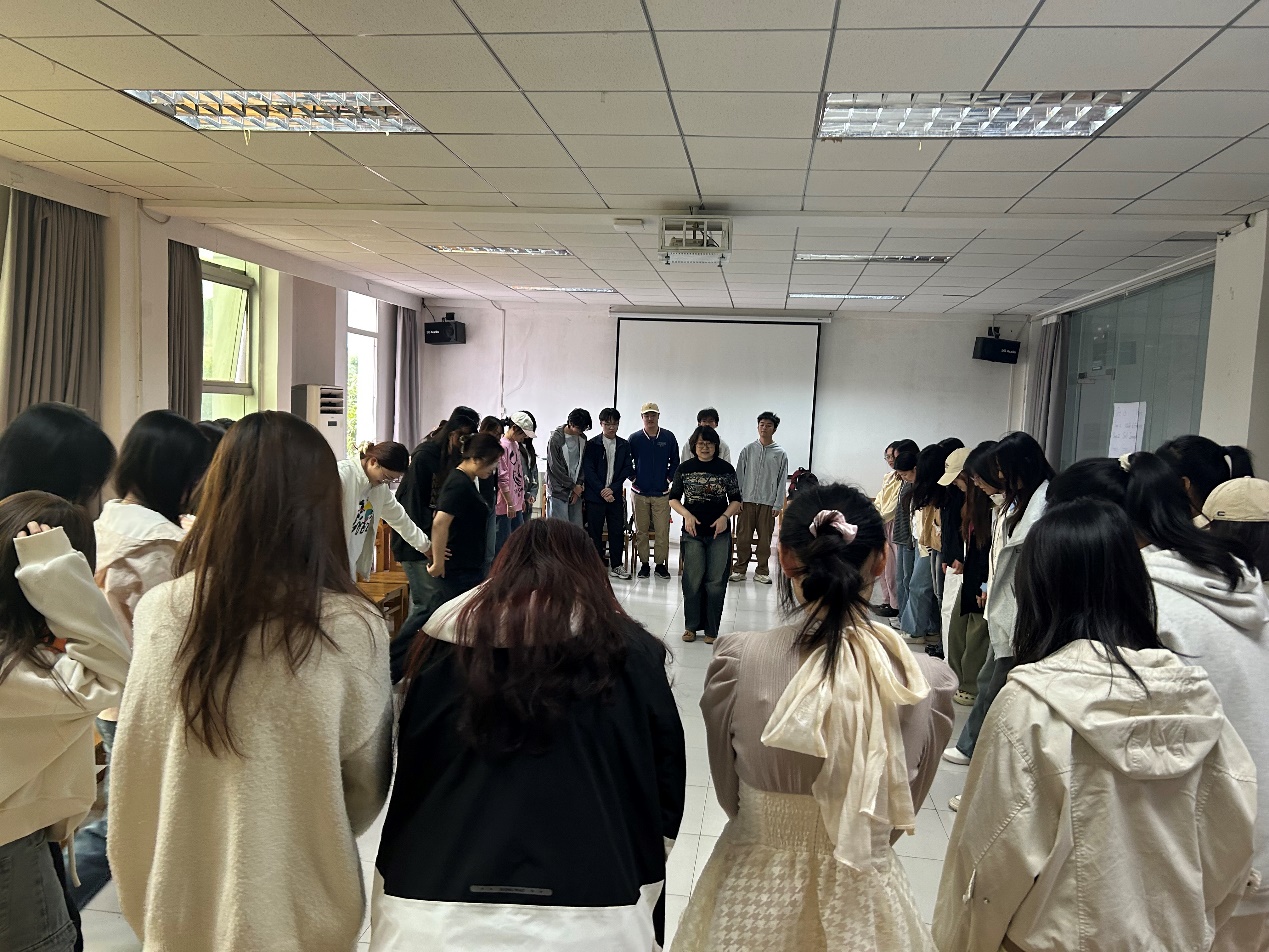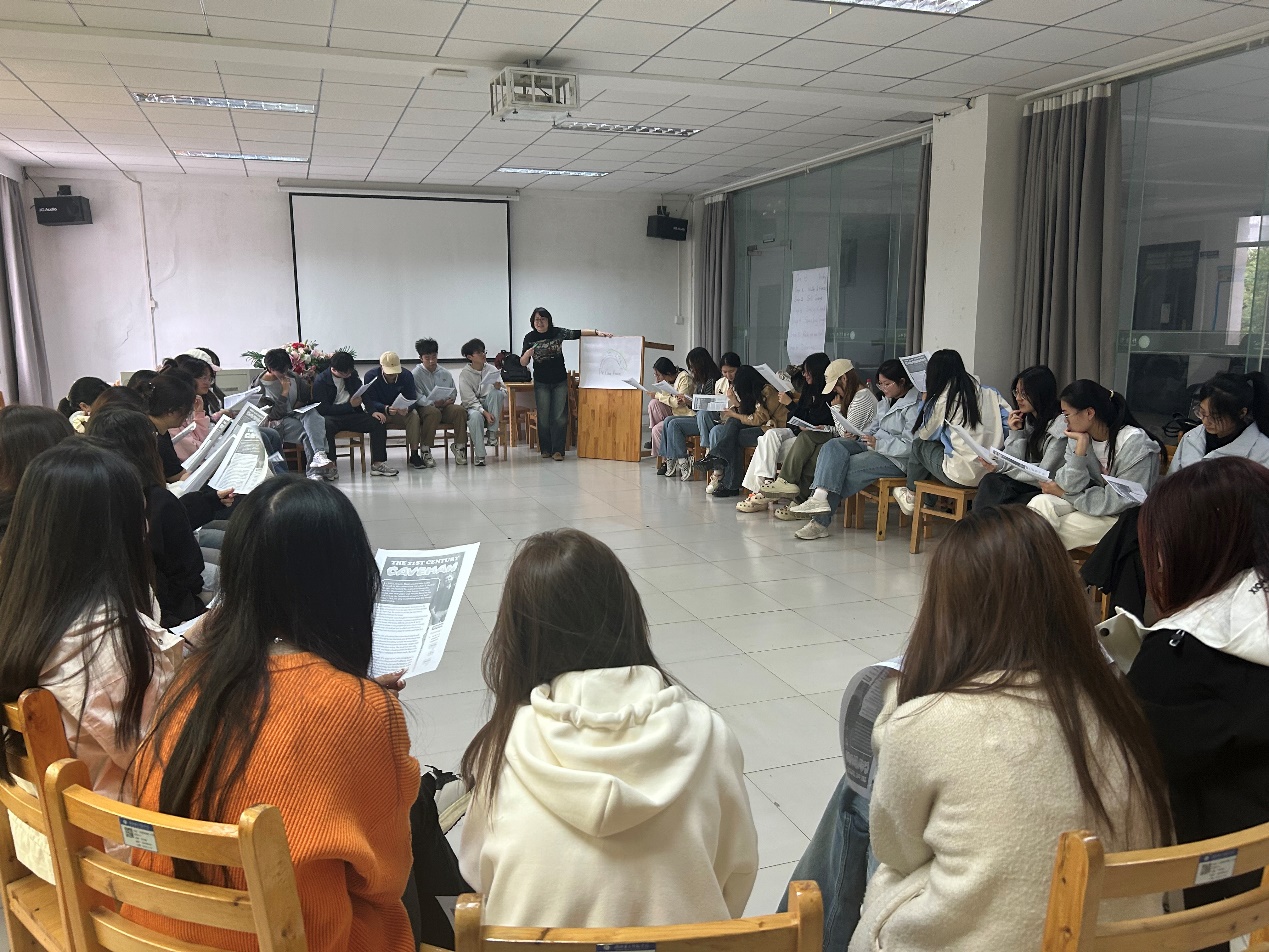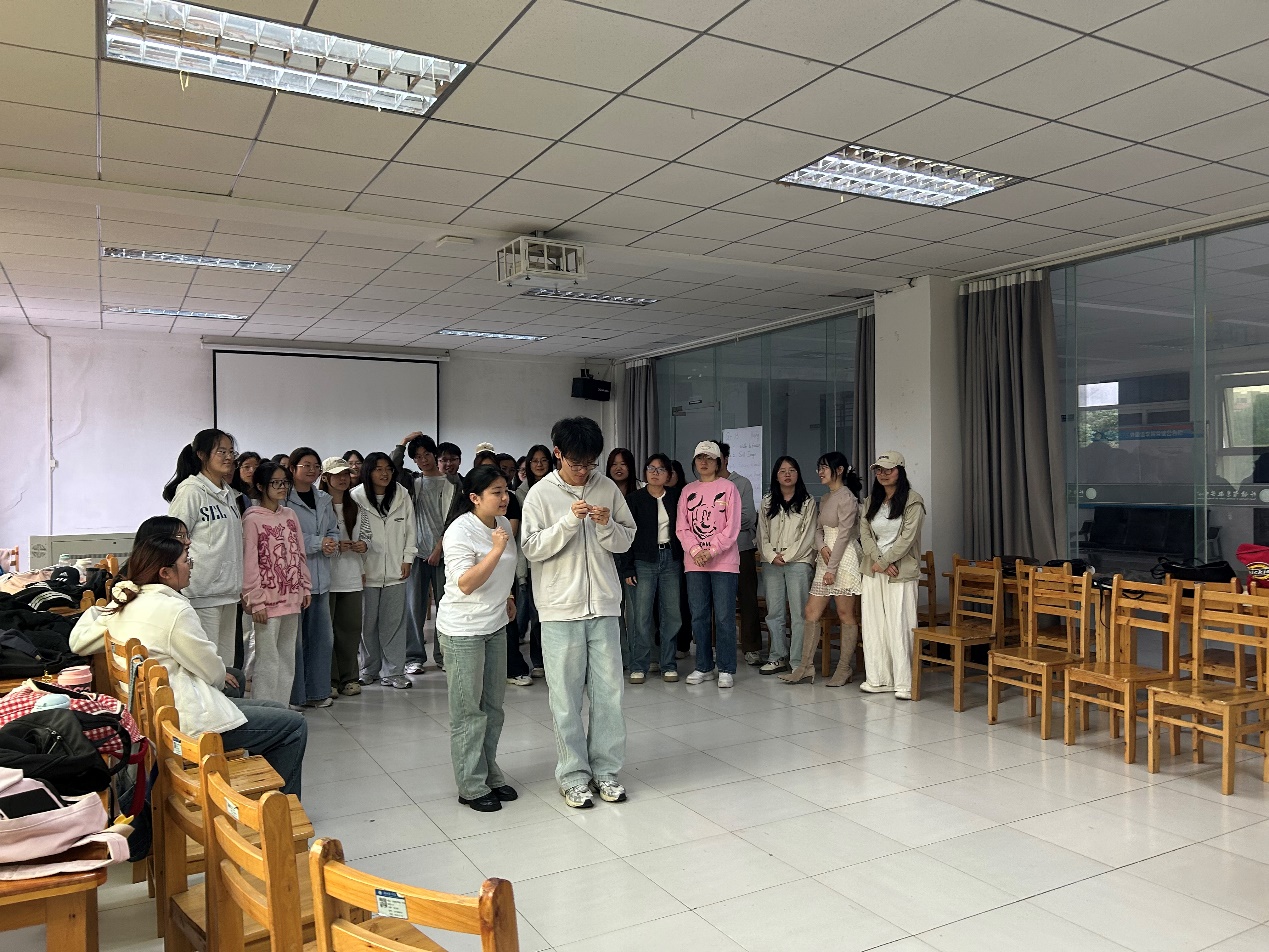(通讯员 马文娟)为探索戏剧与教育融合的创新路径,提升学生英语阅读的主动性与创造力,2025 年 10 月 13 日下午 14:00,外国语学院二楼多功能室内开展了一场别开生面的戏剧范式英语阅读课堂。
本次活动特别邀请到湖北第二师范学院戏剧教育研究中心戏剧教育导师、资深少儿英语教育培训师及教育戏剧践行者段君老师主讲,23 级英语 1 班的 36 名学生全程参与,在沉浸式体验中感受戏剧与英语学习碰撞出的独特魅力。
课堂伊始,段君老师以趣味十足的 “扔球游戏” 让学生快速进入课堂状态。她引导学生想象手中持有彩球,在抛出 “球” 的同时用一个英文形容词介绍自己,随着互动深入,段老师进一步升级游戏形式,学生们从最初坐在椅子上 “扔球”,逐渐过渡到站起来自由移动,模拟 “沙子流动” 、“动物行走“和“数字抱团”,随后她又设计了多人协作的肢体任务,让学生通过默契配合完成动作指令。在一系列循序渐进的互动中,学生们逐渐放松,课堂氛围愈发活跃,展现出强烈的学习热情。
在学生们充分调动积极性后,段君老师将教学重点与英语阅读内容相结合,引入了 “Story wand” 游戏。她手持 “魔法棒”,随机指向学生,被选中的学生需用肢体动作和简单台词还原角色特点,生动的表演不仅让大家快速熟悉了文本角色,更加深了对故事情节的理解。随后,段老师将学生分组,每组围绕一个核心角色为其创作专属台词,并结合故事情节设计简短的表演片段。
最后段君老师进一步深化教学任务,引导学生聚焦阅读文本的细节拓展。她鼓励各小组挖掘文本,并根据她给出的关键词制作海报,创作过程中,学生们分工协作,现场氛围热烈而有序。完成海报制作后,各小组依次上台,一边展示海报,一边用英文讲解细节内容。展示结束后,段君老师逐一对各小组的拓展思路与海报设计进行点评,既肯定了大家对文本的深度挖掘能力和创意表现力,也针对英文表达和海报内容提出了优化建议。
此次戏剧与英语教育融合的实践课堂,不仅为同学们带来了全新的学习体验,也为外国语学院的教学创新提供了有益参考。(图片:马文娟, 审核:冯婷、刘晖)
Empowering English Reading through Drama: Application and Practice of Integrating Drama and Education
(Contributor: Ma Wenjuan) To explore innovative approaches to integrating drama and education and to enhance students’ initiative and creativity in English reading, a unique drama-based English reading class was held at 2:00 PM on October 13, 2025, in the multi-functional hall on the second floor of the School of Foreign Languages.
The event featured Duan Jun, a drama education mentor from the Drama Education Research Center at Hubei University of Education, a senior trainer in children’s English education, and a dedicated practitioner of educational drama. A total of 36 students from Class 1, Grade 2023, participated in the full session, experiencing the unique charm that emerges from the fusion of drama and English language learning in animmersive environment.
The class began with a fun “Ball Throwing Game” designed by Ms. Duan to quickly engage the students. She guided them to imagine holding colored balls and to introduce themselves with an English adjective as they “threw” the ball. As the interaction progressed, Ms. Duan escalated the game. Students moved from initially “throwing” the ball while seated to standing up and moving freely, simulating “flowing sand,” “animal walks,” and “grouping by numbers.” She then introduced multi-person collaborative physical tasks, requiring students to follow action commands through tacit coordination. Through this series of progressive interactions, the students gradually relaxed, the classroom atmosphere became increasingly lively, and they displayed great enthusiasm for learning.
After fully mobilizing the students’ energy, Ms. Duan integrated the teaching focus with the English reading content by introducing the “Story Wand” game. Holding a “magic wand,” she pointed at students randomly. The selected student had to portray a character’s traits using body language and simple lines. These vivid performances not only helped everyone quickly familiarize themselves with the characters but also deepened their understanding of the plot. Subsequently, Ms. Duan divided the students into groups, with each group focusing on a central character to create original dialogue and design a short performance scene based on the story.
Finally, Ms. Duan deepened the learning task by guiding students to focus on expanding details from the reading text. She encouraged each group to delve into the text and create a poster based on keywords she provided. During the creative process, students collaborated on different tasks, creating a vibrant yet orderly atmosphere. After completing their posters, each group took turns presenting them to the class, explaining the details in English while showcasing their work. Following the presentations, Ms. Duan provided feedback on each group’s creative approach and poster design, affirming their ability to deeply analyze the text and their creative expression, while also offering suggestions for improvement on their English delivery and poster content.
This practical class, integrating drama with English education, not only provided the students with a brand-new learning experience but also offered valuable insights for pedagogical innovation at the School of Foreign Languages.









